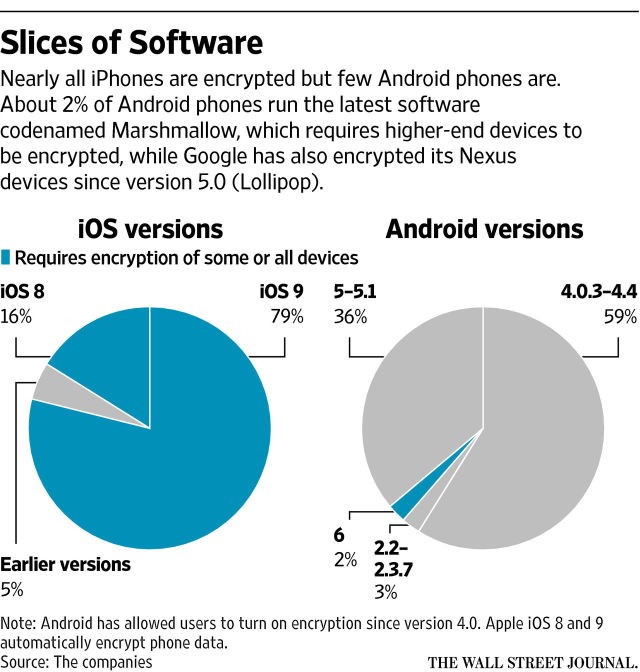
Ever wonder why 95% percent of iPhones are encrypted, but only 10 percent of the 1.4 billion Android phones in the world are encrypted? Two of main reasons have to do with hardware limitations and user incompetence.
In the case of iPhones, we know from the Apple’s OS distribution chart that the vast majority of devices are running iOS 8 or 9, and that encryption has been mandatory since iOS 8.
Android, on the other hand, is an open source OS used by Google’s third-party mobile phone hardware partners. Android’s acceptance relies on establishing a set of standards suitable for each partner based on their hardware limitations. Because older phones suffered from performance issues when running encrypted storage, the company had difficulty convincing manufacturers to enforce such standards, opting to make an optional feature. At one point, it even backtracked on its promise of making Android 5.0 phones encrypted by default. (The sole exception to this rule are Google’s own Nexus phones, which have been encrypted since 2014.)

Most casual users have the tendency to stick with the default settings from the get-go, which is why it’s important to have a solid security from the onset. Unfortunately, encrypting older devices causes noticeable performance issues since older ARM processors are not proficient enough to adequately decrypt and re-encrypt data every time data is written or read from the storage.
Later phones with 64-bit ARM processors use the ARMv8 instruction set, which significantly improves the performance when using encrypted storage; but once again, encryption depends on whether or not the user deliberately elects to encrypt their phone. If you’re unsure whether your phone uses the ARMv8, download the CPU-Z and AID64 information tools to obtain the name, model number, and CPU architecture of the processor in your phone. The Snapdragon 410, 610, 808/810 series as well as the Samsung Exynos 7 and 8 series all include the ARMv8 CPU architecture.
Encrypted storage eventually became a requirement for the more recent Android 6.0—assuming the phone meets the performance requirements—but only 2.3 percent of Androids run the Marshmallow OS. On top of that, only phones that ship with the OS preinstalled are auto-encrypted; those later upgraded to Marshmallow must be manually activated.
Source: Ars Technica
Advertisement
Learn more about Electronic Products Magazine





